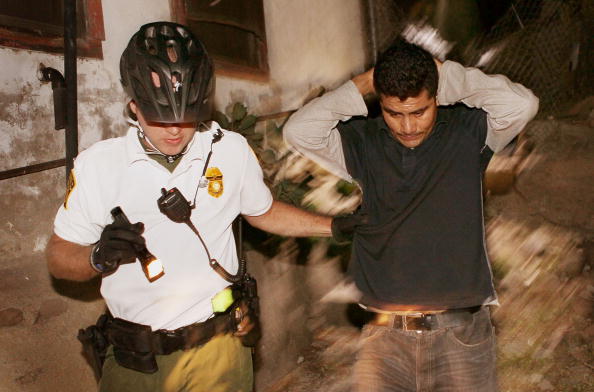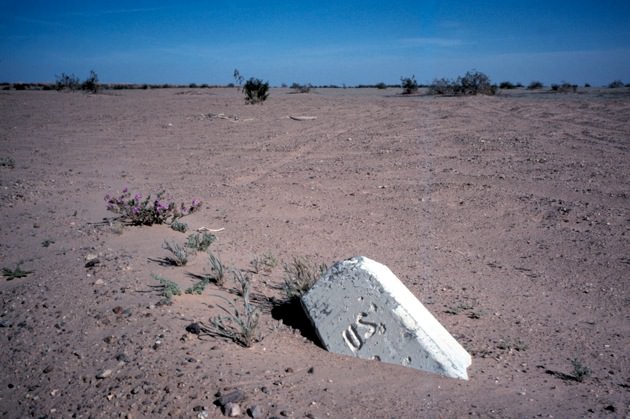On April 23, Governor Jan Brewer of Arizona signed into law what is probably the most stringent and least welcoming immigration law in the nation. Its intent is to have all law enforcement agencies in the state—Federal, state, and local—pool their muscle and get illegal immigrants out of the state of Arizona, pronto.
Senate Bill 1070 may be cited as the “Support Our Law Enforcement and Safe Neighborhoods Act.” Its passage immediately set off a chorus of indignation. The President at once expressed his dismay; an estimated 50,000 people marched in protest in Los Angeles, and the Phoenix Suns, fine in their unity, added “Los Suns” to their game uniforms. Even Rick Perry, the conservative governor of Texas, and a man who has a long and troublesome border to manage, allowed as how he wouldn’t go that far.
It’s just possible that these protests will work. The bill is not scheduled to go into effect until the end of July, and it is said to be under revision. The Justice Department is now reviewing a challenge to it; and there are five separate suits being brought by civic rights and religious groups in Arizona against the law (the Mexican government filed a brief on June 22 in support of one of these). Inasmuch as our country still has a Bill of Rights, I expect that the constitutional lawyers will winnow out some of the more obnoxious provisions, such as Article 8, Section E, which reads:
A law enforcement officer, without a warrant, may arrest a person if the officer has probable cause to believe that the person has committed a public offense that makes the person removable from the United States.
So a street cop, overworked and vulnerable as he or she might be, can make an immediate decision, without the buffer of the judiciary, that could lead to deportation. There are similarly shaky provisions attempting to limit curbside hiring, the method by which contractors get their day labor and immigrants their grocery money; and a complicated systems of fines and punishment for those who knowingly hire illegal aliens. Since all those targeted are human beings, not Martians, it would be interesting to know why the term “alien” has found its way into legal usage. It’s rare that a legal text such as Senate Bill 1070 can have a consistent tone, but this bill does. The word “Mexican” is never used, but the bill radiates hostility to Mexicans above all. How dare they be here, anyway?
I live and work, much of the time, on a quiet suburban street in the Catalina foothills above Tucson. The street is just two miles long, but, in the last year, burglars have cleaned out three houses on it—one just across the street—so efficiently that they might be called home invasion squads. These squads once confined themselves to south Tucson, which is a kind of barrio, but soon decided that there were more plasma TVs a little higher up.
Now and then I try to joke a little with my neighbors, who are mostly elderly, wealthy, and Eastern, by pointing out that we Anglos are the real illegals here. After all we stole Arizona, along with the rest of the southwest, in 1848, when the Treaty of Guadalupe Hidalgo was signed in Texas. The “brown ones,” as George H.W. Bush once referred to his half-Hispanic grandchildren, have obviously the better right to Arizona. They were here when Father Kino, the traveling priest, came through at the beginning of the eighteenth century and helped get the mission built. By the mission I mean San Xavier del Bac, the White Dove of the Desert, one of the loveliest missions in North America. It still rests in its beauty just south of Tucson.
My neighbors don’t cotton much to my joking. Mainly they want to be safe and they aren’t, really. The nice Mexican who works in your garden has to coexist with the bad Mexican who steals your plasma TV. Tucson, indeed all of southern Arizona, has never been anything but scary. The Obama administration, mindful of local fears about lack of security at the border in the run-up to midterm elections, deployed 1,200 National Guard troops there in late May.
The border at Nogales, Sonora, is fifty-five miles from where I write. I rarely go there, not because it’s dangerous—though it is dangerous—but because the deep sadness of the troubles there overwhelms me. And those troubles are much the same, all along the border from Matamoros, across from Texas, to Tijuana, across from California. Lately the drug cartels have upped the ante by pushing north: home invasions, smuggling humans, kidnapping, drugs and more drugs, violence and more violence.
Advertisement
But the sadness I feel at the border is not because of the violence: it’s the eternal struggle of poverty with plenty, a struggle that humiliates and degrades both parties. The only winners are the franchises of McDonald’s and Taco Bell in Douglas or Nogales, Arizona. If we capture those poor people—as we do by the thousands—it’s mandated that we have to feed them, before we send them back across the border.
I don’t see this changing. The ridiculous fences won’t change it. As former Arizona governor Janet Napolitano crisply remarked: “Show me a forty-nine-foot fence and I’ll show you a fifty-foot ladder.” True. The Arizona legislature is basically spinning its wheels. Observe the increasingly Hispanic midwest, where more and more middle-class Latinos are now bringing in their poor cousins to care for their gardens and milk their dairy cows. And the Anglos can’t stop it with laws. For every Mexican deported two or three more will make it through. The numerical edge is with the “brown ones” from the south.
Tucson has always felt like an easygoing Sonoran city, which is one reason I like it. Phoenix has become a portal for just about anything bad. Senate Bill 1070 fails to deal with problems that have been there since the 1850s, when John Russell Bartlett, the New Englander who was responsible for establishing a border between the US and Mexico, drew a line in the desert where, for numberless centuries no line had been. Confusing to the native people, it has led us, inexorably, to the tragic place where we are now.




